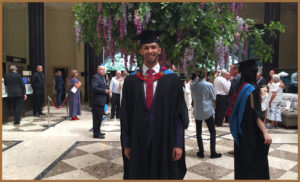Despite what some may believe, having autism at school isn’t necessarily a learning disability. In fact, autistic people can often have a unique perspective and a thirst for knowledge that, if anything, gives us a learning advantage over our classmates.
However if, like me, you have experienced the complications of being autistic at school, or you have seen any of the recently published figures surrounding autistic people at school – then you will no doubt be very aware that, just because autistic people are capable of overachieving, that doesn’t mean we will.
Today I wanted to discuss some of the figures surrounding autistic people in school, and share a valuable lesson I received on how to support autistic people in school/college/university – a lesson which took me from barely keeping my head above water at university to graduating with a grade that my teachers always said I was capable of but my results didn’t always reflect.

The Current Problems Autistic People face in School:
Let’s not beat around the bush, support for autistic people in schools is just not up to scratch. I’ve tried to take an optimistic approach to this because, don’t get me wrong, things are getting better. But, with the snail’s pace at which these adjustments are being made, I can’t help but take a less than chuffed approach to discussing them.
For me, the thing I find particularly troubling about the slow nature of these changes is that, even after adjustments were put in place in 2014, we are still seeing troubling statistics; such as exclusions of autistic children, in England, rising by almost 60% since 2011.
As if that wasn’t bad enough, recent findings from 2017 also demonstrate a need for change as, 3 years after the support was supposed to have become more available, researchers still found that:
- 50% of school teachers said they were not confident in supporting a student with autism
- Less than half of autistic children stated that they were happy at school
- 4 out of 10 parents said that schools were not meeting their child’s needs
The bottom line Is: autistic people make up the minority of school children in an education system which has always been fixed on the majority. As such when changes are needed to support the 1 out of 69 children that are autistic, it seems as though the view is “if it ain’t broke, don’t fix it”.
This is something I have experienced throughout my life, but it is perhaps best demonstrated by my experience in university.

My Experience of Unhelpful Help:
It would be a lie (and an insult) to say that I have never received support during my education (because Lord knows I have had my fair share of support). However, even with all the assistance, extra lessons and additional tools I have been given, I look back at my academic career as a 15-year journey on one of those seesaw-powered rail carts, you see in old cartoons. Basically, it was tough, overly complicated and has left me with little time to enjoy my experience.
Before I started university, I attended multiple meeting with the learning support teachers with the goal of creating a ‘personal learning plan’ (PLP) for my time at uni. However, when I started my course, I discovered that the plan was anything but personal – offering the same level of individuality you would expect from one of those tests you take on Facebook, to find out what kind of potato you are.
When I started my degree, I received a new laptop, a recording device and a mentor who offered me the same advice every student in the university with a PLP was given (someone who became somewhat of a ghost to me, as he was spread so thinly across the university that I barely saw him).
I know I sound ungrateful after all this was serious equipment. However, it wasn’t what I wanted. These trinkets were great n’all, but they were more geared towards me catching up with my class, rather than helping me to achieve my potential.
As a result: I abandoned my laptop in favour of one which didn’t crash when I loaded photoshop; I ditched my recording equipment, as I am more of a written learner than an audio one, and the mentor, who was doing his best to teach me how to spel (joke intended) was relieved of his duties by mutual agreement – I felt I had better use of my time than playing hunt the mentor every week.
This could have been the end of my hopes of getting a degree (and at many times it really did feel like it), but after receiving a lower than expected mark in early December. I decided that, if it was the end, then I would try one more plan and go down fighting.

How I Got the Support I Needed:
My plan started almost identically to my previous experience: once again emailing learning support to book what felt like my 100th appointment. To my surprise though, I discovered that the university had made changes for the new year and now, instead of a single team for one department, there seemed to be a group of learning support officers which had been divided and allocated to each faculty.
This meant that, instead of the old one-size-fits-all model the university had previously implemented, I could go and speak to the leader responsible for learning support in my faculty and, hopefully, receive the personalisation I had so desperately sought.
Inevitably, I realised that I had set my expectations too high – but the changes weren’t without a silver lining. The bad news was that my new support officer was unfamiliar with autism and autistic people but, in contrast, the good news was this meant she wanted to hear all about me: what struggles I faced, what did I want to do about them and how could we come up with a solution to solve them.
What the support officer and I realised from this meeting was that the real problem I had wasn’t with communication or any other more typical autistic complication, but that I was taking assignment briefs far too literally. I was reading every sentence as though it was a box to tick in my assignment, and subsequently doing the bare minimum without exploring or interpreting the information as I was meant to.
We decided that, to fix this, I would set some time aside each week where I would relay the assignment information as I had perceived it, then discuss it with the support officer what needed developing and what could be left as it was – unlike, the tutors and lectures she couldn’t help with the content but helped me interpret the instructions that my autism was preventing me from seeing.
Flash forward 7 months and I was being told that I would be graduating in a cap and gown, instead of the dunce’s hate I was beginning to expect. To tell the truth, I’m still flabbergasted – both at my surprise turnaround and at how easy it felt, once I got the right kind of support.

(I would have looked ‘flabbergasted’, if I wasn’t too busy fighting back the 1,000,000° heat!)
How to Support Autistic People in School/College/University:
In 2017, 70% of parents said that ‘having a teacher that understood what autism was’, would mean that their children would be much happier in education. However, from my experience, I have to disagree.
A generalised understanding of autism was what led people to assume that my grammar and spelling was the reason for me not achieving my full potential. It was only when I met someone blissfully unaware of the intricacies of autism that things got better.
Of cause a basic understanding will help autistic people but, I personally believe, that it is a waste of time, effort and money to help all autistic people by the same means. Instead, we need to start supporting each and every individual autistic person, as though they are just that: ‘individual’.
As discussed, this is definitely a two-way street as, in the past, I have to admit that I had just expected to get the right support after telling someone that I am autistic. I now know that was wrong.
Communication really is key here as, when you’re dealing with something as wide and diverse as the autistic spectrum, it’s important to be precise with what needs we have. Furthermore, we need to be determined when looking to get support. Autistic people, and families of autistic people can’t just expect a stranger to know the ins and outs of a diagnosis, after just one meeting – so expect many stumbles before success but don’t give up.
I hope the information given here and the experience I have shared proves the need for better tailored support in our education system. Despite somewhat of a bleak start to this article, I do believe autistic people have a bright future with the correct support. We just need to know how to ask for it.

Carry on the Conversation
How do you think we could make things better for autistic people in education? Do you have any success stories of your own? Let me know in the comments below.
As always, I can also be found on Twitter: @AutismRevised and via my email: AutisticandUnapologetic@gmail.com.
If you like what you have seen on the site today, then show your support by liking the Autistic & Unapologetic Facebook page. Also, don’t forget to sign up to the Autistic & Unapologetic newsletter (found on the sidebar on laptops and underneath if you are reading this via mobile) where I share weekly updates as well as a fascinating fact I have found throughout the week.
Thank you for reading and I will see you next Saturday for more thoughts from across the spectrum.


